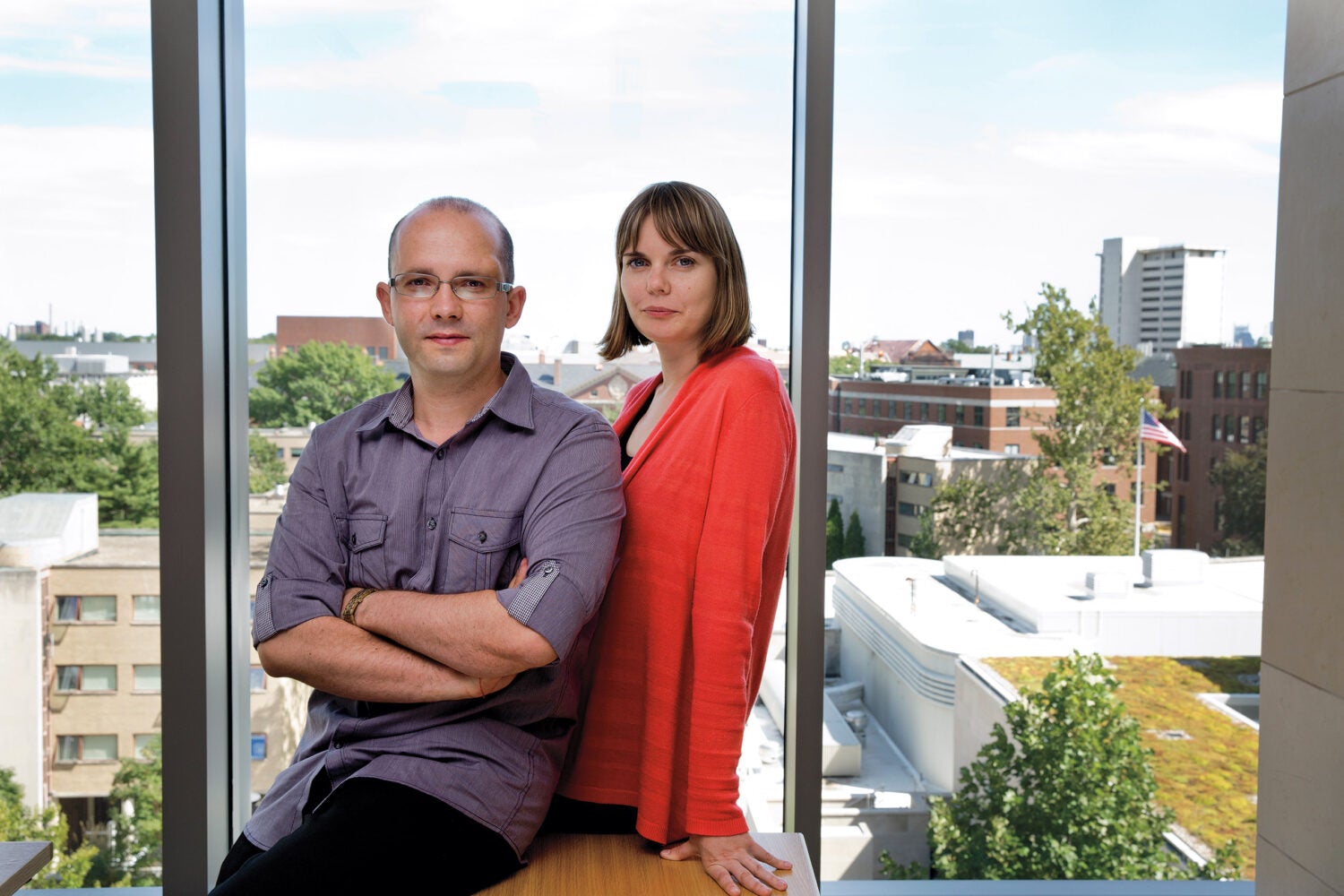Malaysia Airlines Flight 17 was shot down over eastern Ukraine on July 17, killing all 298 people aboard, Svitlana Starosvit LL.M. ’13 and Volodymyr Shkilevych LL.M. ’12, lawyers with the Ministry of Foreign Affairs of Ukraine, worked around the clock with lawyers from Malaysia, the Netherlands and Australia to draft treaties delineating responsibilities for investigating the tragedy. Ukraine had the right under international law to be lead investigator under the “situs” rule, Starosvit says, but agreed to transfer these powers to the Dutch to ensure an independent and impartial investigation. She and Shkilevych also worked on treaties regarding deployment of special civil forces from the three other nations to help Ukraine secure investigators’ access to the site.
The current political crisis in Ukraine defines both the professional and personal lives of the couple, who married in 2008 after they met in the ministry and then attended the LL.M. program at Harvard Law School. Until this August, when she returned to HLS to enter the S.J.D. program, Starosvit was counselor in the Minister’s Office and supervised the Office of Legal Affairs and the International Law Department within the ministry. Shkilevych is the deputy head of the International Law Department.
Over the past year, after Russia annexed Crimea and continued incursions into Ukraine in defiance of international condemnation, their work became all-consuming. Starosvit advised the minister on the legitimacy of the presidential elections held in May. When some polling stations in the east were closed due to threats of violence, people from Crimea who had fled the region had to vote at polls specially opened for this occasion.
With opponents of the election arguing that failure to hold voting in some places rendered the entire outcome illegitimate, Starosvit’s review of national legislation led to her opinion that this was not the case. “The results in the polling stations can be declared invalid, but this does not affect the results of elections nationwide,” she says.
Shkilevych, in turn, was a member of the delegation that negotiated an arrangement with a museum in the Netherlands to store—until further notice—an exhibition of historical treasures that belong to Ukraine but were under the management of a Crimean museum. The exhibition, “Crimea: a golden island in the Black Sea,” opened in Amsterdam not long before Russia occupied Crimea on March 18, and Ukraine wants to ensure the safety of the priceless artifacts.
In perhaps their most pressing project, the couple conducted numerous meetings with foreign lawyers and experts on international law from Europe and the U.S. They analyzed conventions to see what rules Russia may have broken through its actions in Ukraine and what might be done about it, working with a team of lawyers to develop a strategy for holding Russia accountable before the international courts for what Starosvit calls “blatant violations of international law and specific conventions,” adding that the sensitive nature of the issue prevents her from saying more.
On Sept. 18, Ukrainian President Petro Poroshenko addressed the U.S. Congress, urging it to provide military assistance to counter pro-Russian eastern separatists. While President Barack Obama ’91 condemned Russia’s actions in Ukraine, he has limited military support to nonlethal equipment only. “Personally, I think the U.S. is more active than any other players around the situation in Ukraine,” says Shkilevych. “But I don’t think political pressure and some economic pressure are enough to stop Russia and resolve this situation.”
The recent political turmoil meant that the couple worked 24/7, following the news constantly in order to give prompt advice to the minister. Many times they were awakened by emergencies. “In late February and early March, when the situation with Crimea’s occupation was unfolding rapidly, we were called during the night to prepare legal opinions explaining in legal terms what Russia had violated,” says Starosvit, who was born and raised in Crimea.
Among other matters, they advised on legal avenues Ukraine could pursue in response and outlined a plan to organize the evidence that would be collected.
“Luckily, in Kiev, things are more or less quiet; there’s no military action. Compared to eastern Ukraine, we cannot complain,” she says. At the same time, she adds, “when you see all these reports about our territory being shelled, people dying, including civilians, it is hard to stay diplomatic and focused.” Many of their family members in eastern Ukraine have now fled; ironically, she says, they’ve moved to Russia, where they have close relatives.
What has sustained the couple is the broader importance of their work. “Many times we were stressed and wanted to give up,” Starosvit says. “But the idea that keeps us [going] is that this isn’t only about Ukraine but about the integrity of international order and public international law.”
Starosvit expects to travel back and forth to Ukraine during the course of her HLS studies, while Shkilevych remains in Kiev—and when she finishes the S.J.D. program, she may return to the Ministry of Foreign Affairs to combine diplomatic service with teaching.
When she applied to the program in April, as the crisis was growing, her plan was to go into academia and teach public international law. “Now, of course, my plans have changed a lot,” she says. “My country is at war. It is reported that around 3,000 people, including civilians, were killed. I do not think it is even possible to think about a cozy professor’s chair somewhere in the university at the moment.”
